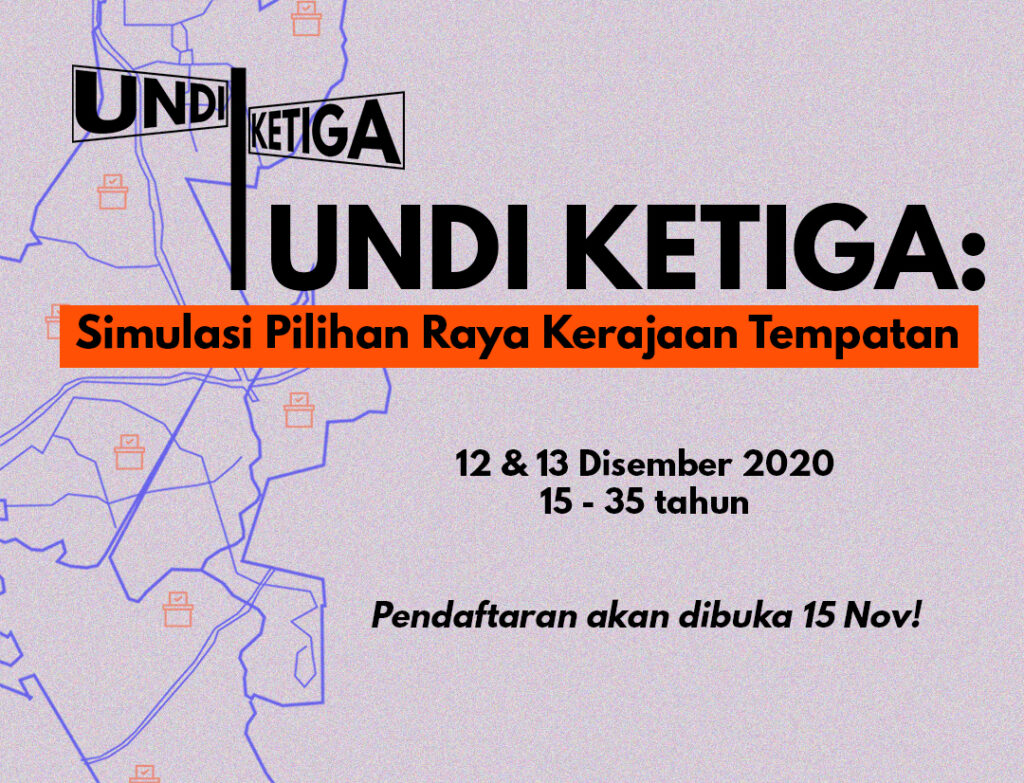Why Undi Ketiga

By Yap Ming Yao
All of us learn in school that Malaysia is a democracy. That means we elect our leaders and those in government, whose job is to run the country, and that much is clear at both the national and the state level. Every General Election (GE), we vote for our Members of Parliament (MPs) in Parliament and for our state representatives (ADUNs) in each State Legislative Assembly (DUN). The coalition with a majority of MPs in Parliament or in each DUN, of course, then has the right to form a government because they have the democratic mandate of the people. Our mandate – the consent of the people – is what gives politicians legitimacy. But not every tier of government is elected; unlike MPs and ADUNs, local councils such as MBSJ in Subang Jaya and MBPJ in Petaling Jaya are not, are appointed. This is wrong because this is undemocratic – and this is why we support Undi Ketiga. Undi Ketiga is the third vote that Malaysians currently lack: the right to vote for the third tier of our government, local government, and not just at the state and federal levels.
What exactly is a local council?
The best way to imagine them is as the third tier of government: MPs represent you at the national level in Parliament, ADUNs represent you at the state level, and local councils represent you at the local level. Local authorities, especially city councils like Majlis Bandaraya Subang Jaya (MBSJ), Majlis Bandaraya Petaling Jaya (MBPJ), Dewan Bandaraya Kuala Lumpur (DBKL), Majlis Bandaraya Shah Alam (MBSA), and Majlis Bandaraya Johor Bahru (MBJB), have a wide range of responsibilities that affect our daily lives on the ground compared to legislation from MPs and ADUNs. For example, city councils are responsible for:
- dealing with the consequences of urbanisation such as illegal factories, slums, and environmental protection
- granting of licenses for businesses, advertisements, kindergartens, markets, and hawkers
- the management of roads and related infrastructure such as streetlamps and traffic lights.
- pest control, hygiene inspections on restaurants, flood mitigation, and overall cleanliness.
All of this means that local councils’ decisions directly affect how we live our lives. Imagine a routine trip to the market to buy vegetables, where you drive out of your house and wonder for the twentieth time when the pothole in the road you use every day will be fixed. As you make your way to the market, the traffic lights are broken (again) and when you do arrive, you start wondering again – this time if the factory belching out smoke you passed by was illegal or not. You go through the market, thinking it seems to be getting dirtier every week, and not being sure if the vendors have gone through the appropriate checks to receive their licenses to sell. Every problem above is the responsibility of your local government, and how well each is carried out is of course dependent on how well your local government does.
This leads to the question as to why these local councils aren’t elected. The history here is telling: not only were local governments once elected by the people in Malaysia, but the clear lack of appropriate reasons these local council elections were stopped were and should remain unacceptable. Local council elections were first suspended due to the state of emergency being declared due to the Indonesia-Malaysia 1964 Konfrontasi. From 1966 to 1973, elected local councils were gradually abolished by state governments until in 1976 the Local Government Act made this suspension permanent, abolishing all local councils. The absence of proper justification for the continued abolishment of local councils today is jarring.
Why should we bother pushing for elections at the local level then?
We believe the answer is simple. People in positions of power are nothing more than that: people. When they know they have to answer to the rakyat come the next election, they have an incentive to properly carry out their jobs, whether this is maintaining roads or properly regulating recycling, meaning they have more of an obligation to pay attention to the people’s interests. If local councils were elected, we would be able to choose those who would best be able to serve our communities and reject those who have shown that they’re not fit for the job. The next time you see a pothole that seems to be immune to being fixed, consider a world where local councils are pushed to work harder through the ballot-box.
Ming Yao is a law student at the University of Cambridge and researcher for UndiSaksama.